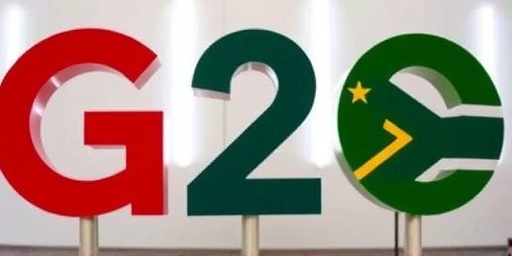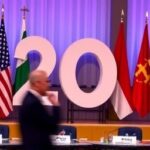Johannesburg, South Africa – In a bold display of multilateral diplomacy, the G20 summit officially opened in South Africa today, with world leaders swiftly adopting a comprehensive leaders’ declaration despite the glaring absence of the United States. The US boycott, stemming from deep-seated objections to the agenda’s heavy emphasis on climate change and global inequality, has cast a long shadow over the proceedings, signaling potential fractures in international cooperation.
The summit, hosted in the vibrant economic hub of Johannesburg, brings together finance ministers and heads of state from the world’s largest economies. Yet, without American representation, discussions on reforming global financial institutions and addressing pressing environmental challenges took on a distinctly Southern Hemisphere flavor, led by host nation South Africa. President Cyril Ramaphosa, in his opening remarks, underscored the urgency of the moment: “This G20 summit is not just about the powerful; it’s about empowering the marginalized. The absence of one voice cannot silence the chorus of the Global South.”
South Africa Champions Declaration on Equity and Sustainability
As the first African nation to host the G20 summit, South Africa seized the opportunity to steer the conversation toward issues disproportionately affecting developing countries. The adopted declaration, a 20-page document outlining commitments to sustainable development, explicitly calls for increased funding for climate change mitigation in vulnerable regions. Key provisions include a pledge to mobilize $100 billion annually for green transitions in low-income nations, drawing from innovative financing mechanisms like carbon taxes on multinational corporations.
Statistics from the World Bank highlight the stakes: Africa, despite contributing less than 4% of global greenhouse gas emissions, faces up to 75% of the world’s extreme weather risks by 2030. South African officials pointed to these figures during plenary sessions, arguing that the declaration represents a “paradigm shift” from traditional G20 priorities dominated by Western interests. Environmental advocates, including Greenpeace International’s executive director Jennifer Morgan, praised the move: “South Africa’s leadership ensures climate change isn’t sidelined. This declaration could be a game-changer for equitable global action.”
The document also addresses global inequality head-on, proposing reforms to the International Monetary Fund (IMF) and World Bank to give emerging economies greater voting power. Currently, the US holds veto power in the IMF with 16.5% of votes, a structure critics say perpetuates imbalances. Under the new framework, developing nations could see their representation rise by 15%, potentially unlocking trillions in investment for infrastructure and poverty alleviation.
US Boycott Exposes Deep Divisions on Core Agenda Items
The US boycott of the G20 summit marks a significant diplomatic rift, with Washington citing the event’s “overly politicized” focus on climate change and global inequality as incompatible with American priorities. In a statement released from the White House, US Treasury Secretary Janet Yellen explained, “While we remain committed to global economic stability, this summit’s agenda veers too far into ideological territory, neglecting immediate concerns like supply chain resilience and inflation control.”
Behind the scenes, tensions have simmered for months. US officials reportedly lobbied against including strong language on fossil fuel phase-outs, fearing it would hamstring domestic energy policies amid ongoing debates over green energy subsidies. The boycott echoes past instances of US disengagement, such as the 2017 withdrawal from the Paris Agreement, but this time it isolates America from a forum it helped found in 1999 during the Asian financial crisis.
Analysts note that the US boycott could cost the G20 its traditional clout. The United States, with its $25 trillion economy, typically drives consensus on trade and fiscal policies. Without it, negotiations on digital taxation for tech giants – a hot-button issue – proceeded without the voice of Silicon Valley’s biggest backer. European Union Trade Commissioner Valdis Dombrovskis remarked during a sidebar meeting, “The US absence is felt, but it also frees us to pursue bolder reforms that benefit the many, not just the few.”
Diplomatic sources reveal that invitations extended to US representatives were met with firm rejections as early as June. This snub has ripple effects, straining bilateral ties with South Africa, a key US partner in African trade under the African Growth and Opportunity Act (AGOA). Trade volumes between the two nations exceeded $20 billion in 2022, and experts warn that the US boycott might jeopardize future collaborations on critical minerals essential for electric vehicle batteries.
Emerging Economies Rally Behind South Africa’s Reform Push
With the US on the sidelines, emerging economies at the G20 summit in South Africa have coalesced around host-led initiatives to tackle global inequality. Brazil, India, and Indonesia – representing over 40% of the world’s population – voiced strong support for overhauling debt relief mechanisms. The declaration commits to suspending interest payments on $500 billion in low-income country debt, a measure aimed at freeing up funds for health and education amid post-pandemic recovery.
South Africa’s delegation highlighted domestic successes as a model: Since the end of apartheid in 1994, the country has lifted 10 million people out of extreme poverty through progressive social programs. Extending this to the global stage, Ramaphosa proposed a “G20 Solidarity Fund” seeded with $50 billion from member contributions, targeting inequality hotspots in sub-Saharan Africa and Southeast Asia. Indian Prime Minister Narendra Modi, attending virtually, endorsed the fund: “Global inequality is the root of instability. South Africa’s vision aligns with our own quest for inclusive growth.”
Discussions also delved into gender and racial disparities, with panels featuring African Union Chair Moussa Faki Mahamat emphasizing the need for $300 billion in annual investments to close the gender pay gap in developing nations. Data from the UN shows that women in these regions earn 23% less than men for similar work, exacerbating poverty cycles. The summit’s side events included workshops on blockchain for transparent aid distribution, showcasing tech solutions to entrenched inequalities.
China, another powerhouse, used the platform to advocate for its Belt and Road Initiative as a counterweight to Western-led finance. Beijing pledged an additional $10 billion for climate change adaptation projects in Africa, positioning itself as a reliable partner in the void left by the US boycott. This geopolitical maneuvering underscores shifting alliances, with BRICS nations (Brazil, Russia, India, China, South Africa) gaining prominence in G20 deliberations.
Climate Commitments Gain Momentum Without US Involvement
The G20 summit‘s climate change agenda dominated Day 1, with delegates from 18 attending nations endorsing ambitious targets that the US had previously watered down. A centerpiece is the commitment to triple renewable energy capacity by 2030, building on COP28 outcomes. South Africa, drawing from its own Just Energy Transition Partnership (JETP) – backed by $8.5 billion from G7 nations – aims to phase out coal while protecting 90,000 mining jobs.
Environmental metrics paint a dire picture: Global temperatures have risen 1.1°C since pre-industrial levels, per IPCC reports, with Africa bearing the brunt through droughts affecting 100 million people yearly. The declaration mandates annual progress reports on emissions reductions, with penalties for non-compliance including trade restrictions on high-carbon imports. UN Secretary-General António Guterres, addressing the assembly, stated, “This G20 summit proves that progress on climate change doesn’t require universal buy-in – it requires bold action from those willing to lead.”
Without US participation, talks on loss and damage funding advanced rapidly. The fund, established at COP27, now targets $400 billion by 2025, with contributions from wealthier G20 members like Japan and Germany. Activists from the Global South celebrated the momentum, though some, like Kenyan climate activist Elizabeth Wathuti, cautioned: “Real change means holding polluters accountable, not just pledging more money.” Side sessions explored nature-based solutions, such as reforesting 1 billion hectares globally, with South Africa committing 350 million hectares of its territory.
The absence of American fossil fuel lobbyists allowed for frank discussions on methane pledges, with attendees agreeing to cut agricultural emissions by 30% through sustainable farming. This aligns with South Africa’s National Climate Change Adaptation Strategy, which has already reduced water scarcity impacts in rural areas by 20% since 2019.
Shifting G20 Dynamics Signal Broader Geopolitical Realignment
As the G20 summit in South Africa unfolds, the US boycott is reshaping the group’s internal dynamics, potentially paving the way for a more multipolar world order. Historically, the G20 has coordinated responses to crises like the 2008 financial meltdown, where US-led stimulus packages stabilized markets. Today, without that anchor, decisions on cryptocurrency regulation and AI governance leaned toward inclusive models favored by the Global South.
Experts predict long-term implications for international trade. The World Trade Organization (WTO) could see stalled reforms if US isolationism persists, affecting $28 trillion in annual global commerce. South African economists, citing a 2023 IMF study, warn that unchecked global inequality could shave 7% off world GDP by 2050 through social unrest and migration pressures.
Looking forward, the summit sets the stage for the 2025 G20 in Brazil, where themes of Amazon preservation and food security will build on South Africa’s legacy. Ramaphosa closed Day 1 by announcing bilateral deals with the EU for $15 billion in green tech transfers, signaling that partnerships will evolve beyond traditional powers. As one delegate put it, “The G20 summit without the US isn’t weaker – it’s rebalanced.”
With two days remaining, eyes are on potential breakthroughs in debt restructuring, which could avert defaults in 50 vulnerable economies. The US boycott may have opened the door, but sustaining momentum on climate change and global inequality will test the resolve of a divided yet determined G20.








